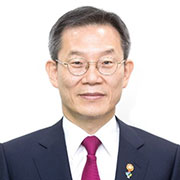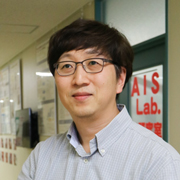Plenary Talks
AI Semiconductor Policy and Non-volatile Memory-based Neural Networks

Prof. Jong-Ho Lee
Seoul National University
Former Minister of Science and ICT
Abstract
AI is becoming an irreversible technology as it spreads across industries, public sectors, and daily life, and is being applied in various fields. AI technology and semiconductor technology are closely related. Semiconductor technology has a great influence on AI technology development in terms of computing performance and power consumption.
In this talk, we introduce the Korean government's support for AI technology research and development including algorithms and low-power AI semiconductor technology that mimics the functions of the brain. In particular, we look at AI technology development policies and semiconductor technology that are closely related to them.
We discuss the research results of flash memory-based neural networks for implementing low-power AI. This discussion emphasizes the research results of neural networks utilizing vertical NAND and AND flash memories. We also explain ferroelectric tunnel junctions (FTJs), an example of ferroelectric memory. Finally, we briefly describe an example of in-memory computing integrated with low-power gas sensors on the same substrate.
Bio
Jong-Ho Lee received the Ph.D. degrees from Seoul National University, Seoul, in 1993 in electronic engineering. In 1993, he worked on advanced BiCMOS process development at ISRC, Seoul National University as an Engineer. In 1994, he was with the School of Electrical Engineering, Wonkwang University, Iksan, Chonpuk, Korea. In 2002, he moved to Kyungpook National University, Daegu Korea, as a Professor of the School of Electrical Engineering and Computer Science. Since September 2009, he has been a Professor in the School of Electrical and Computer Engineering, Seoul National University, Seoul Korea. He served as the Minister of Science and ICT of the Republic of Korea from May 2022 to August 2024. From August 1998 to July 1999, he was with Massachusetts Institute of Technology, Cambridge, as a postdoctoral fellow, where he was engaged in the research on sub-100 nm double-gate CMOS devices. He has authored or coauthored more than 477 papers published in refereed journals and over 512 conference papers related to his research and has been granted 116 patents in this area. His research interests include CMOS technology, neuromorphic technology, gas sensors, and 3-D NAND flash memory devices. Prof. Lee is IEEE Fellow and a Lifetime Member of the Institute of Electronics Engineers of Korea (IEEK). He has been served as a subcommittee member of IEDM, ITRS ERD member, a general chair of IPFA2011, and IEEE EDS Korea chapter chair. He received more than 35 awards for excellent research papers, excellence in teaching, and research excellence.
Reimagining Our Environment: The Nexus of Human Cognition and Ambient Intelligence

Prof. Joo-Ho Lee
Ritsumeikan University
Abstract
As artificial intelligence and robotics continue to advance rapidly, the harmonious coexistence of humans and machines has emerged as a critical challenge. This keynote address introduces the concept of 'Intelligent Space' as an innovative solution to this challenge.
Intelligent Space is an advanced spatial system designed to create a human-centric environment. This system utilizes a network of sensors and actuators distributed throughout the space to recognize human presence and behavior, providing real-time, appropriate support. Each module is equipped with sophisticated communication capabilities, organically connecting with external devices to exchange information and control.
The core strength of Intelligent Space lies in its ability to overcome the limitations of individual devices and create synergy. This system enhances the functionality of all devices within the space, ultimately providing users with more advanced services. Particularly in the current context where robotic technology is developing relatively slower than artificial intelligence, Intelligent Space plays a crucial role in complementing the shortcomings of robots and maximizing their utilization.
This keynote will delve into the technical structure of Intelligent Space, its potential applications, and its prospective impact on future society. Through this discussion, we aim to present a blueprint for a future society where humans and robots coexist harmoniously.
Bio
Joo-Ho Lee (Senior Member, IEEE) received the B.E. and M.E. degrees in electrical engineering from Korea University, Seoul, South Korea, in 1993 and 1995, respectively, and the Ph.D. degree in electrical engineering from The University of Tokyo, Tokyo, Japan, in 1999. He is currently a Professor with the Department of Information Science and Engineering, Ritsumeikan University, Shiga, Japan. From 1999 to 2003, he was a JSPS Postdoctoral Researcher with the Institute of Industrial Science, The University of Tokyo. From 2003 to 2004, he was a Research Associate with Tokyo University of Science, Japan, and in 2004, he joined Ritsumeikan University as an Associate Professor. From 2008 to 2009, he was a Visiting Scholar with the Robotics Institute, Carnegie Mellon University, Pittsburgh, PA, USA. In 2017, he was a Research Professor with the Department of Mechanical Engineering, Korea University. His research interests include intelligent environments, intelligent robots, computer vision, machine learning, and medical/healthcare applications. He is a member of the RSJ, JSME, SICE, HIS, IEICE, KROS, and IEEJ.

